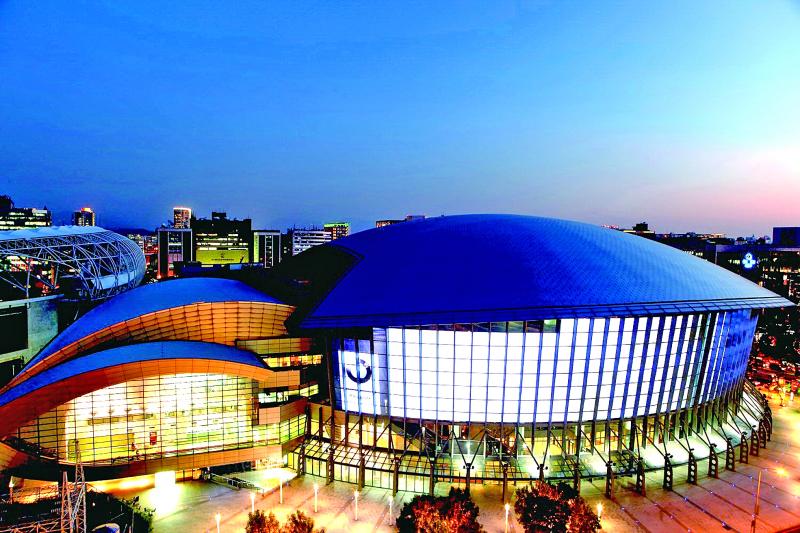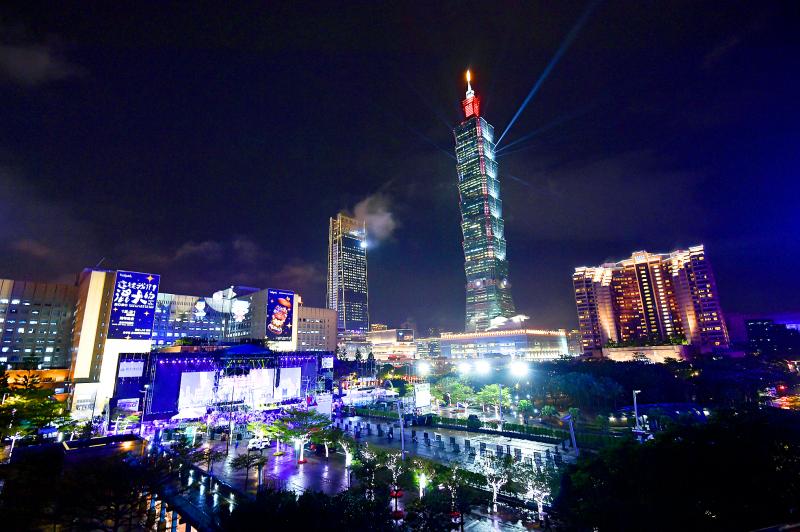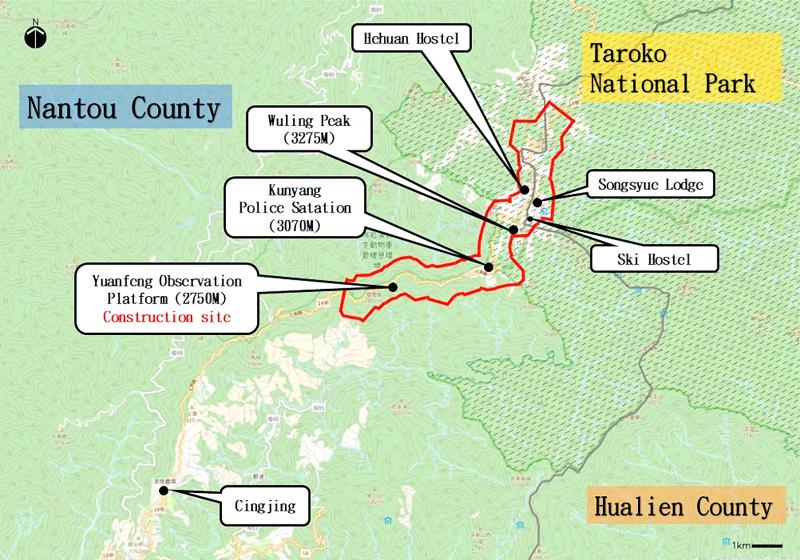Last year, Kenneth Cheng (鄭仁杰) climbed Taiwan’s highest mountain for the first time in his life. Leaving Paiyun Lodge (排雲山莊) well before dawn to begin the final ascent to Jade Mountain’s (玉山) main peak, the Tainan-based technician was astonished by the number of stars he could see.
For months afterward, whenever Cheng described that glorious sight to friends, he told them the visibility of celestial objects was due to altitude and the national park’s clean air. The lodge is 3,402m above sea level, and it’s true that, at higher elevations, there’s less air between the observer and celestial objects, and therefore less atmospheric distortion.
Not until Cheng saw a social media post about light pollution did he realize that there was another reason why he’d been able to see countless stars from Jade Mountain.

Photo courtesy of Taipei Mass Transit Corporation
As the crow flies, the mountain isn’t far from a road, or from busy resorts like Chiayi County’s Alishan (阿里山). By the standards of densely populated Taiwan, however, the amount of artificial light is minimal. On the approach to Jade Mountain, there are no streetlights, neon advertisements or vehicle headlights. There’s no nearby town generating a diffuse glow.
The night sky enchanted early humans, and inspired some of humankind’s oldest stories. Its disappearance is vexing, and not merely for aesthetic reasons.
Sleep scientists say light pollution can disrupt our nighttime rest. According to ecologists, artificial light confuses sea turtles navigating through coastal waters, causes birds to crash into skyscrapers and makes it more difficult for fireflies to find mates. Those who say we need to reduce energy consumption in order to reign in climate change point at streetlights that burn long after everyone has gone to bed.

Photo: Tu Chien-jung, Taipei Times
Axiou Lin (林正修), chairman of the Taiwan Dark-Sky Association (台灣暗空協會, TDA), says that “improper lighting can cause ecological imbalances and species to go extinct.”
Perhaps the most egregious example of light pollution is the 2,400m2 LED display wall at Taipei Arena. It’s the nation’s largest digital screen, and the second largest in Asia.
“The brilliant light disturbs the sleep of those living nearby, and makes it difficult for office workers to concentrate during the day,” Lin says.

Photo courtesy of Taiwan Dark-Sky Association
Parents of students at Guangfu Elementary School (光復國小) have complained of another type of light pollution emitted by Taipei Arena. The titanium plates on the arena’s roof reflect sunshine, affecting students in at least 45 classrooms, United Daily News reported on April 26.
“Compared to other environmental issues, the public isn’t especially concerned about the problem of light pollution. Brightly-lit cities are widely regarded as a symbol of prosperity. But the world is getting brighter and brighter at a rate of 2 percent per year,” says TDA’s Lin. “Advocacy and lobbying are needed to get people to pay more attention to this issue.”
In terms of a legal framework to deal with light pollution, Taiwan lags behind comparable countries. South Korea has been using legislation to control the problem since 2012. TDA’s Web site (www.darksky.tw) says the publication of guidelines by Taiwan’s Environmental Protection Administration “can be considered a start,” even though the document neither defines when a light hazard becomes a public nuisance, nor specifies penalties.
Efforts to reduce light pollution are often opposed by those who think criminality thrives in darkness. This conflict was recognized by Minister of the Interior Hsu Kuo-yung (徐國勇) during a meeting with a TDA delegation on Nov. 18.
When discussing streetlighting policy in the wake of the murder of Malaysian student surnamed Chung (鍾) in Tainan in late October, Hsu told TDA that local officials were under great pressure, and that “whoever cuts the number of lights, loses the election.”
According to TDA’s Facebook page, Hsu used the occasion to reiterate his support for the concept of dark skies. He said that the planned nationwide roll-out of smart meters will reduce the amount of electricity wasted by lighting. He also suggested that light pollution be taken into consideration when setting out the powers and duties of those in charge of urban design and national parks.
TDA’s Web site includes photos that demonstrate how wrongly deployed security lighting can actually make spotting intruders more difficult.
Lin believes the government should try to build a consensus so people understand that “reduced outdoor lighting and safety can coexist. It isn’t a binary choice.”
TDA supports a combination of education and coercion. The harmful consequences of light pollution are mentioned in high-school science courses, but Lin thinks everybody should know more about the need to reduce lighting in sparsely populated areas, as well as what can be done to combat the problem in cities.
“Preventing urban light pollution is particularly important in Taiwan, especially in Taipei, where the authorities receive around 1,000 light-pollution complaints every year. We need to educate people to only use lighting when and where they need it. Shop signs should be turned off after business hours,” Lin says.
Awareness of the issue began to grow some years before TDA was established earlier this year, Lin says. He cites the reaction in 2016 when the Directorate General of Highways (DGH) installed streetlights at Wuling (武嶺) and Kunyang (昆陽) in a high-altitude section of Taroko National Park (太魯閣國家公園): “Astronomy fans protested that the artificial light was damaging the night sky. The DGH immediately turned off the power and soon removed those lights.”
Wuling and Kunyang now lie within Hehuan Mountain Dark Sky Park (合歡山暗空公園), which was established in August last year. The Nantou County Government is backing the park in the hope it will pull in stargazing tourists.
According to Lin, at least NT$60 million has been spent on hardware, training, promotion, organizing events and obtaining certification from the International Dark-Sky Association, with which the TDA is affiliated. Of the 85 dark-sky parks recognized by IDA, only four are in Asia. Japan has two, and there’s one in South Korea.
The IDA’s Web site defines a dark-sky park as “a land possessing an exceptional or distinguished quality of starry nights and a nocturnal environment that is specifically protected for its scientific, natural, educational, cultural heritage and/or public enjoyment.”
Whether the land is publicly or privately owned, there must be “permanent, ongoing public access to specific areas” listed in the certificate.
There are just 122 outdoor lights within the 1,345 hectares of Hehuan Mountain Dark Sky Park. Three quarters of them have been modified to minimize light pollution. In many cases, this was done by adding lampshades to ensure light goes only downward onto the road. Every light in the park should meet IDA standards within 10 years, Lin says.
TDA is also involved in dark-sky projects on uninhabited Daqiu Island (大坵島) in the Matsu archipelago and Penghu County’s Cimei Island (七美嶼). Both face challenges. The bridge that will connect Daqiu with Beigan Island (北竿島) by the end of 2022 may spur development on the former. Cimei’s energetic mayor hopes a sky unpolluted by artificial light will attract boatloads of stargazers. Without additional funding, however, there’s little he can do.
Steven Crook, the author or co-author of four books about Taiwan, has been following environmental issues since he arrived in the country in 1991. He drives a hybrid and carries his own chopsticks.

The primaries for this year’s nine-in-one local elections in November began early in this election cycle, starting last autumn. The local press has been full of tales of intrigue, betrayal, infighting and drama going back to the summer of 2024. This is not widely covered in the English-language press, and the nine-in-one elections are not well understood. The nine-in-one elections refer to the nine levels of local governments that go to the ballot, from the neighborhood and village borough chief level on up to the city mayor and county commissioner level. The main focus is on the 22 special municipality

The People’s Republic of China (PRC) invaded Vietnam in 1979, following a year of increasingly tense relations between the two states. Beijing viewed Vietnam’s close relations with Soviet Russia as a threat. One of the pretexts it used was the alleged mistreatment of the ethnic Chinese in Vietnam. Tension between the ethnic Chinese and governments in Vietnam had been ongoing for decades. The French used to play off the Vietnamese against the Chinese as a divide-and-rule strategy. The Saigon government in 1956 compelled all Vietnam-born Chinese to adopt Vietnamese citizenship. It also banned them from 11 trades they had previously

In the 2010s, the Communist Party of China (CCP) began cracking down on Christian churches. Media reports said at the time that various versions of Protestant Christianity were likely the fastest growing religions in the People’s Republic of China (PRC). The crackdown was part of a campaign that in turn was part of a larger movement to bring religion under party control. For the Protestant churches, “the government’s aim has been to force all churches into the state-controlled organization,” according to a 2023 article in Christianity Today. That piece was centered on Wang Yi (王怡), the fiery, charismatic pastor of the

Hsu Pu-liao (許不了) never lived to see the premiere of his most successful film, The Clown and the Swan (小丑與天鵝, 1985). The movie, which starred Hsu, the “Taiwanese Charlie Chaplin,” outgrossed Jackie Chan’s Heart of Dragon (龍的心), earning NT$9.2 million at the local box office. Forty years after its premiere, the film has become the Taiwan Film and Audiovisual Institute’s (TFAI) 100th restoration. “It is the only one of Hsu’s films whose original negative survived,” says director Kevin Chu (朱延平), one of Taiwan’s most commercially successful